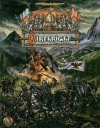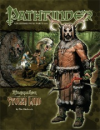hawkeyefan
Legendary Pubber
- Joined
- Nov 1, 2020
- Messages
- 1,987
- Reaction score
- 4,899
Okay. If gamemastering could be described a falling somewhere on a spectrum between "storytelling" and "referee" then my style would be deep on the referee side of the dial.
How so?
I’m genuinely asking. I’m curious how people view this topic because I don’t really see it as a spectrum, with storytelling on one end and refereeing on the other. They both just seem like things a GM needs to do.
I know that “story” is a loaded term when it comes to RPGs, but I’d love to get past that. I don’t think it’s the GM’s job to tell the players a story….I don’t think I’d find that a truly satisfying game experience.
But I don’t think I can agree that GMing doesn’t involve things that we would otherwise classify as storytelling. Creating characters, setting up conflict, pacing, focus…all kinds of things, although everyone will do each to different degrees.



 !
! )!
)!
 !
!
 !
!


 !
! ?
?






